- Home
- Duncan Lay
The Wounded Guardian Page 5
The Wounded Guardian Read online
Page 5
Martil nearly stopped in shock. Karia had said Father Nott was ‘very old’, but Martil had assumed she had been speaking with all the experience of a six-year-old, to whom anyone over thirty years was ancient. But Father Nott really was elderly. The priest’s sparse white hair barely covered his scalp, and his face was deeply lined and marked with age spots. His hands, gnarled and twisted, shook slightly. But his eyes were a bright blue, they sparkled with life, and his smile was warm and genuine.
‘Karia!’ he exclaimed.
‘Father!’ she cried and raced into his arms, hugging him as if she would never let him go. Then she was crying, sobbing as if she could erase the memories of the past six months in one flood of tears.
Martil did not quite know where to look and could not help but feel she was far better off here than with Edil, himself or even this mysterious Uncle Danir.
At last her tears dried up and turned into soft sniffles. ‘And who are you and what are you doing here?’ Nott asked, looking up at Martil from where he cuddled Karia.
‘It is a long story, Father,’ Martil sighed.
‘Come on in. I might be getting on a bit but I still have time for a long story or two,’ the old priest smiled, then pointed at the swords hanging from Martil’s hips. ‘But can you leave those outside, my son? I don’t believe in having them in my house.’
Martil slipped off his sword belt, wrapped it around his swords and left them outside, propped up beside the front door. Not feeling their familiar weight was both relaxing and disquieting.
Father Nott showed them into his house; Karia obviously remembered where to go, for she rushed straight to the kitchen, while Martil followed the old priest at his much slower pace. The home was simply furnished—basic wooden furniture and not too much of it—but it was overlaid with a feeling of calmness. Just being inside there made Martil feel relaxed. He knew many priests lived in luxury while their flock suffered but this home was no more than the average farmer would have. Karia had installed herself at the large kitchen table and was waiting excitedly for food. Father Nott patted her absently on the head as he went past, opened a cupboard and took out a half-loaf of bread and a lump of cheese, which he placed on a plate and popped in front of her.
‘Tea?’ he asked Martil.
‘Please. But can I help you?’ Martil offered, seeing how Father Nott’s hand shook as he held the kettle.
‘Sit down. The day I can’t make tea is the day I finally meet my God,’ the old priest chuckled, placing the kettle on the stovetop. Martil sat down beside Karia, who was already ripping off chunks of bread and cheese and wolfing into them—although Martil knew she had eaten two apples, several sticks of dried meat and a hefty oatcake already. He watched the old priest bustle around the kitchen, digging out cups, dropping in chunks of crystallised honey and then preparing the teapot with tea leaves.
‘I take it we will not be seeing Edil again, not until my day of judgement, anyway,’ Nott said quietly, producing a jug of milk and pouring out a glass for Karia.
Martil glanced at Karia, unsure what to say.
‘You do not have to say anything more. I always knew that family would come to a bad end. I am just glad to see that Karia is still alive,’ Nott said calmly, as he poured the tea. ‘I hope you like honey.’
‘Of course.’ Martil never drank tea with honey usually—the chances of getting honey and milk with army-issue tea were about the same as having a Berellian axeman offer to read you a bedtime story. But his future freedom depended on impressing this priest.
‘I knew Edil would not treat her very well. But this is far beyond what I expected. She has not been to see me, or even to the village school I run, in months. Now I see why. She’s smaller than when she left here and she actually had clothes of her own back then. Once she has eaten, I think it will be time for a bath, then she can go to bed. And then, perhaps, you can tell me what happened.’
‘Are you talking about me?’ Karia looked up from her food.
‘We were just saying that old tunic is not as good as the dress you left here in,’ Father Nott said smoothly, as Martil struggled to think what to say.
‘Didn’t have time to pack when we ran from the farm,’ Karia explained. ‘I had to leave everything behind and then Da could never find a traveller with a little girl to take a new dress from.’
‘These are the struggles of being a bandit that the sagas never tell us about,’ Father Nott intoned, giving Martil a wink.
‘Are you being silly, Father?’ Karia stopped guzzling milk and looked up, a frothy moustache on her grubby face.
‘Just a little, my dear. Now, how about a bath?’
‘Do I have to?’
‘If you want to sleep here tonight you do. Even the pigs might kick you out of the sty tonight, the way you are smelling.’
Karia giggled and then burped.
Martil sought a way of escaping bathtime.
‘Well, I need to go and see the local militia and explain what happened today,’ he announced.
Nott looked at him as if he knew exactly why Martil wanted to leave but merely said: ‘Edil and his boys were well known around here. You should have no problems with the militia. In fact, I should imagine they might even want to buy you a drink for your efforts.’
Martil did not show it but he was relieved to hear the old priest’s words. The militia might be pleased to see the end of Edil but they might be just as happy to lock up a stranger until they had extracted most of his gold.
‘If there is trouble, ask them to see me. And it might be as well if you take your swords with you. There’s not many men around here who could claim to have…removed…Edil and his three sons without receiving so much as a scratch.’
‘Do you have anything for dessert?’ Karia interrupted and Nott chuckled.
‘After your bath we might think about it. Now come on. You’ll have to help me fill the tub.’
Martil took this as his cue to leave the cosy domestic scene. Swinging on his swords and walking towards the militia post felt like an escape—but he could not help but think it was a temporary one. Father Nott was far too old to look after a small girl. In fact it was amazing he had not been called up to serve his God more personally before now.
Martil stopped off at Tomon, where he unsaddled the horse and fed him. The feel of the saddlebags reminded him he had left a fortune in gold just sitting in the open. Even for someone who cared little about money, it was foolish. He left the bags in the old priest’s bathhouse before walking to the militia post, reflecting that Father Nott may be old, but help could be bought with gold.
Sergeant Hutter liked a quiet life, which was why Chell suited him perfectly. In the big towns and cities, sergeants of the militia had to deal with professional thieves, brawls, riots and murderers. Here, a few drunks and the odd theft was the extent of the problems. There was Edil and his sons but until he could get some extra men from his captain, he had no intention of chasing around the woods looking for them. At one time he had dreamed of wearing the golden epaulettes of a captain, of serving in the big cities and even meeting the King. But a few years of midnight patrols had dampened his enthusiasm, and then seeing his partner get stabbed to death beside him had put him off promotion. He had received his sergeant’s stripes for bringing in the killer and had managed to land this cushy post afterwards. That was enough for him, and his wife and children appreciated the country life better than the cramped terrace house they’d had back in the city. Now his expanding stomach showed how much he enjoyed the locally-grown produce. He had the respect of the community and set himself up as the perfect trainer for young recruits, which he sent on to the towns after a few years. Impressing young recruits and old farmers was more than enough excitement for the pay he received.
But he had not lost his instinct for danger. This was why the hairs on the back of his neck stood up when the warrior with the two swords walked into his militia post. Quickly he rounded up his three men from various parts of the buildi
ng and together they listened to the man’s story.
‘So you killed them all? Edil and his sons are just lying out there in the forest?’ he could not help but ask at the finish.
The man turned those eyes on him and it was all Hutter could do to stop the shiver down his spine.
‘That’s what I said,’ he repeated.
Hutter thought about it for a moment. How best to tackle this one without trouble?
‘Can I get your name?’ he asked curiously. Edil and his sons had not been particularly skilled but odds of four to one were enough for most men.
‘Martil. I’m a former war captain in the Ralloran army,’ the man explained.
Something stirred in Hutter’s memory, the way his afternoon snack had been stirring in his stomach since this warrior walked in.
‘War Captain Martil? The Butcher of Bellic?’ he breathed.
He saw the man’s face tighten in anger for a moment, then relax.
‘Aye. But I prefer just Martil now,’ the man said coolly.
Hutter ignored that. If the fabled War Captain Martil had been attacked by Edil, then the vicious old fool and his brutal sons had obviously paid the price and he was well rid of a thorny problem. Best of all, he would not have to try and arrest this warrior.
‘You are welcome to go back and have a look. I’m staying with Father Nott,’ Martil offered.
Hutter snorted. He could see one problem was solved and he had no intention of looking for another. ‘No need for that! Let the animals choke on their rotten carcasses! We should give you a medal for cleaning out that pit of vipers! I’ve got a file as thick as my new constable here on Edil and his sons. Stealing animals, waylaying travellers—you name it. If the forest wasn’t so big, I’d have been ordered to muster the village and hunt them down. But they were stupid enough, or smart enough, never to be truly successful bandits and make the trouble of hunting them down worth it. No, I’ll file a report for my captain and then breathe a sigh of relief.’
‘I’m free to go and get some supplies then?’ Martil asked.
‘Of course! Enjoy yourself! We might even go and buy you a drink later.’
Martil left smiling; Karia had not been mentioned and he preferred to keep it that way.
The militia watched Martil walk across to the inn and disappear inside.
Hutter’s new constable, a gangly youth named Turen, broke the silence.
‘Should we watch him, Sarge? There’s something strange here. I mean, it took all four of us to bring down Edil’s son Hibbet when he’d had too much to drink, the black-bearded bastard.’
Hutter cuffed him over the head. ‘He’s Captain Martil. One of the Butchers of Bellic. They say he used to eat Berellian axemen for breakfast, and dine on the souls of their weeping families. Edil and his boys wouldn’t have stood a chance.’
Turen nodded doubtfully, while the other two muttered agreement. But the young man still had one more question.
‘How do you dine on someone’s soul, Sarge? Surely it wouldn’t taste very nice?’
Hutter sighed. ‘Maybe I should get you to watch this Martil. You’ll anger him and then he’ll have removed my two biggest problems in the one day.’
Cezar liked to work alone. Once released to find his targets, he could not be stopped. But this was no ordinary mission. Apart from what it meant to King Markuz, if King Tolbert found out the Berellian Champion was in his country killing Ralloran officers, even disgraced ex-officers, it would be enough to start a new war. Besides, without the help of Brother Onzalez, he would not be able to find his prey so easily and quickly. Of course, travelling around Rallora with a Fearpriest would have been impossible but Onzalez had other, magical, means of being contacted. Cezar was hidden in a stable, where the bizarre ritual would not attract any attention. He had killed a goat, then filled a shallow silver bowl with its blood. Then he called Onzalez’s true name, the name Zorva had given him, the name emblazoned on Onzalez’s robe. It was in an ancient language and Cezar had had to practise it a dozen times before he had got the inflection and phrasing right. But by now he had mastered it; proof of that was when the blood in the bowl began to swirl, faster and faster, then suddenly stopped and became as clear and smooth as a silvered mirror. Onzalez’s face—or rather his cowled and hidden face—appeared in the surface.
‘Macord is dead,’ Cezar said simply.
‘Ride east from where you are. The village of Quall is where Captain Snithe lives. He drinks heavily. It will be easy. But you must hurry. I have received another vision from our God, and it tells me that what you are doing is even more important than we imagined. One of these five men will be a danger to us. End it.’
‘As you command.’ Cezar bowed his head. By the time he raised it again, Onzalez’s face had disappeared, as had the blood in the bowl.
Martil drank two tankards of reasonable ale, then bought oats, dried meat, salt, fruit and honey-almond sweets from the innkeeper. Normally he would never have touched the last but he had a feeling he might need them for Karia at some point.
He was given a wide berth by the various farmers and villagers who gathered in the inn. His initial plan had been to stay there until he was sure Karia was asleep. But despite the size of the village, the inn was packed. He had been curious about that—until he spotted the distinctive costume of a bard warming up in the corner. He could not help but groan. Bards travelled around the country, bringing news to small villages such as this, as well as to bigger towns and cities, then performed sagas in song or poem form, or both. Martil had no problem with the news but he hated the sagas. Partly because there were plenty that seemed to feature him—but mostly because they were never true. The bards who sang or recited these sagas had never been near a battlefield—and consequently their songs and poems concentrated heavily on heroism and self-sacrifice and never mentioned spilled intestines. He hated them because he had once enjoyed them, once believed them, until he joined up and saw the real thing. He sighed. Even before the prospect of being forced to sit and listen to a bunch of sagas, he had wanted to get out. It was on nights such as these, when he watched men greet old friends, and swap stories over a few ales, that he felt the most lonely.
Once he had had friends. But then they were killed and he became a captain. And once you were a war captain, you did not have friends. You had men who served you, you had rivals, you had enemies aplenty, but you did not have friends.
The bard warmed up with a saga poem about King Riel, the Norstaline monarch who had been given a sword by the dragons themselves. It was all Martil could do not to spit in disgust. When he had been a new recruit, he had dreamed of following a noble king, of being part of an army that saved his country. Then he had fought his first battle and swiftly became concerned with just staying alive. And when he became a war captain, and sat in on war councils with the King, he came to realise that kings were just like everyone else. He saw the petty jealousies, the fears, the whims indulged. He could smell the King’s bad breath and see how foolish he looked when he drank too much. It was hard to think of a king as a being touched by Aroaril when he threw up after gorging himself, or roared with laughter watching sycophants pretending not to be bothered by the stench of his farts. No, far better to stay away from royalty.
Martil looked around and decided he wanted to get out of the inn, even if it meant seeing Karia again. He looked behind the bar, where the innkeeper kept an hourglass hanging on the wall, but the man had become engrossed in the bard’s peformance and forgotten to turn it, the sands lying quietly in the base of the glass turner. Still, surely enough time had passed that she would be asleep, he reasoned.
He left, slinging his sack full of food over one shoulder, and breathing deeply once he was outside. He walked back to the priest’s house, ignoring the few villagers still out and about at this time. Most were either in the inn or at home, eating with their families and playing with their children. He knew what it had been like. Once he had lived like this, before the war came to his co
untry. He did not need to look into the houses to see what they were doing. Nor did he want to. Seeing happy families was too painful.
He discovered Father Nott sitting quietly, pouring himself a glass of whisky. He had the strange feeling the old man had been waiting nervously for his return.
‘My one vice. Some say it’s the secret to my long life and good health,’ the old priest greeted him.
‘What do you say?’
‘They are fools. Aroaril keeps me here, not a glass of fermented grain. Join me?’
‘Is she asleep?’
Nott chuckled. ‘Do you think I would be sitting here quietly if she wasn’t? After her bath, and two helpings of cherry pie, she fell asleep, protesting that she was not in the least bit tired.’
Martil relaxed a little and sat down opposite the old priest.
‘I’d love one. The combination of average ale and bad sagas in the inn has my stomach churning,’ he said.
‘Ah, yes, we have a bard in town tonight. And no doubt you have seen too much war to enjoy foolish tales about it now,’ Nott said as he first poured, then passed a whisky to Martil.
Martil decided to break the silence.
‘So, looking after young children, is that the sort of thing you do often?’
Nott smiled sadly. ‘Karia was only the second. The first was her mother.’
Martil sipped his drink. ‘Her mother?’
‘Aye. My wife had just died and we had not been blessed with children during our marriage. I did not know why, and Aroaril would not answer my prayers on the subject. Then this baby was abandoned, given over to my care. I saw it as part of a grand plan. This, obviously, was the reason why I had never had children, so I would be free to look after this one. She was a beautiful child and grew into a beautiful woman. Too beautiful for these parts. I’d had such hopes for her.’

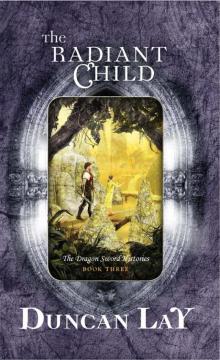 The Radiant Child
The Radiant Child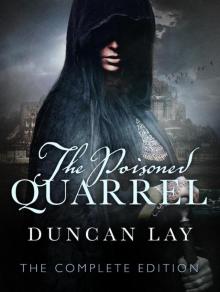 The Poisoned Quarrel: The Arbalester Trilogy 3 (Complete Edition)
The Poisoned Quarrel: The Arbalester Trilogy 3 (Complete Edition)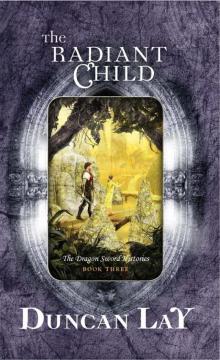 Radiant Child
Radiant Child The Wounded Guardian
The Wounded Guardian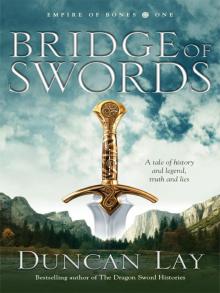 Bridge of Swords
Bridge of Swords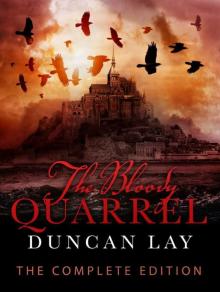 The Bloody Quarrel (The Complete Edition)
The Bloody Quarrel (The Complete Edition) Valley of Shields
Valley of Shields Risen Queen
Risen Queen The Risen Queen
The Risen Queen Wall of Spears
Wall of Spears